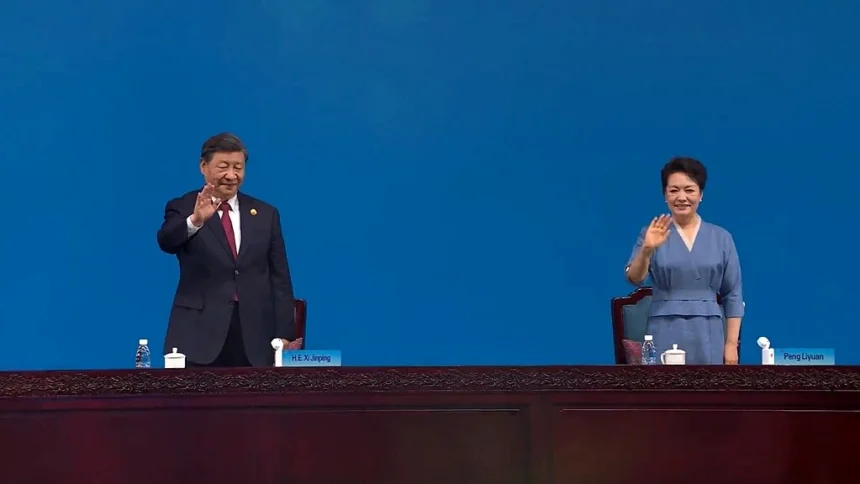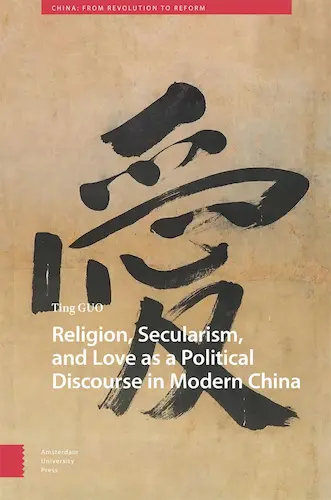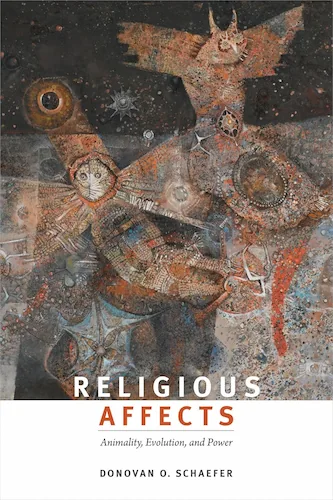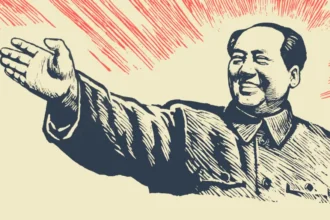Love as a Political Discourse
What is the meaning of love in modern Chinese politics? This book argues that the discourse of love (ai 愛) marks China’s political modernity as it is introduced, adapted, and engineered as a key element in the building and rebuilding of a modern nation.
- Love as a Political Discourse
- Religious Roots of Secular Nationalism under Atheist Regimes
- From Christianity to Socialism
- Love as Spiritual Salvation
- Authoritarian Traditionalism
- Parental Governance and Hong Kong as a Filial Child
- Transforming the Political Discourse of Love in Transnational Activism
- Critical and Decolonial Approaches to Religion
- Political Religion
- Language of Religious Affects and Nationalism
The modern meaning of ai as an expression of interpersonal affection and sentiment, rather than a marker of moral character in Confucian classics, was first introduced by nineteenth-century missionaries who used the character ai to translate the concept of love in biblical passages such as “for God so loved the world.”
This new notion of love further gained prominence during the May Fourth and New Culture Movements, where it became a key symbol of modern subjectivity and individual liberty embraced by reformers and intellectuals.
Religious Roots of Secular Nationalism under Atheist Regimes
What are the religious influences underscoring the discourse of love as a critical medium for politics in an atheist state? What are the specific tactics of its deployment under different political leaders, especially female leaders whose political ideas have been thus far overlooked?
Contemporary China has witnessed a return of charismatic authority in the era of digital culture.
Well known for having endorsed the idea of bo’ai 博愛 (universal love) in his thinking, Sun Yat-sen 孫中山 (1866–1925), the “father of modern China,” left numerous instances of the phrase rendered in calligraphy.
Many argue that bo’ai indicates a distinct influence from Mohism and Christianity, and Sun was commonly recognized as a Christian reformer.
However, as this project will show, Sun was rather eclectic in his intellectual thought which evolved from the secret societies’ sworn brotherhood to Kropotkin’s mutual aid, Henry George’s social gospel, and was later more inclined to international socialism; so was his wife Soong Ching-ling 宋慶齡 (1893–1981), who is famously remembered as a bourgeois Christian representing Republican elites.
From Christianity to Socialism
Although best known as the wife of Sun Yat-sen and the Mother of Modern China, and as the daughter of a US-trained Chinese missionary (Charlie Soong 宋耀如, 1864–1918) with humble origins whose medical dreams were crushed by his white American superiors, Soong was nonetheless cosmopolitan in sensibility, informed by her diverse transnational experience and sensitivity to issues of race and grassroots struggles.
Increasing evidence in recent years also points to Soong’s connection to the Third International, and this book demonstrates that Soong was emotionally committed to the socialist ideals even though she is largely known as a bourgeois Christian from the CCP’s opposition camp.
Love as Spiritual Salvation
Much like the Republican Nationalist government, the Communist government has also embraced secular nationalism. Yet unlike the Nationalists, the CCP aimed beyond religion, setting its sights on a complete transformation of the old society by establishing itself as a new political religion and spiritual sovereignty, in particular under Mao and summarized in this project as the political religion of re’ai 熱愛 (ardent love).
This transformation sought to incorporate traditional popular religion within its own system of beliefs and myths and used the language of love to reinterpret socialism that had subtly appropriated traditional religious morals and symbols. Such political affect was effectuated with the Maoist discourse of love which developed from a class discourse to a form of spiritual salvation.
This book builds on but further a forefront theory in religious studies, namely religious affects.
As Mao famously declared at the Yan’an Forum on Literature and Art in 1942, “Nowhere in the world does there exist love or hatred without cause or reason. As for so-called ‘love of mankind,’ there has never been this kind of unifying love since mankind split into classes.”
The Yan’an Forum led to the creation of Maoist revolutionary operas, including the famous White-Haired Girl, adapted from a piece of popular folklore with a memorable line: “The old society forced people to become ghosts, but the new society changes ghosts into people.”
This revolutionary opera gained prominence during the Cultural Revolution when the discourse of love became not only a slogan but also a form of spiritual salvation in which the people actively engaged. This interactive and engaging nature of the Mao cult beyond a top-down exercise of power allowed its contemporary development into spontaneous expressions of love for Mao and Maoist China.
Authoritarian Traditionalism
Contemporary China has witnessed a return of charismatic authority in the era of digital culture. But contrary to scholarly and popular assumptions, Xi differs from Mao in that he is the first leader in socialist China to explicitly leverage “traditional cultures and religions,” particularly filial piety, to draw parallels with the populace’s allegiance to the state.
This marks a departure from Maoist rhetoric in which traditional moral and familial elements were implicit rather than explicit. Xi’s portrayal as a caring family man, a devoted husband, and a formidable leader also adds a personal dimension to his political persona, distinguishing him from the deified leadership style and religious fervor under Mao. For instance, the narrative under Xi also showcases his relationship with Peng Liyuan, presenting them as the paradigmatic couple and leaders, and casting the Chinese nation as a unified, content family.
Although the personal cult around Xi has allegedly toned down since 2018, the central place of political rhetoric around “traditional” cultures and religions underlying the political discourse of love continues to legitimize aggressive “wolf warrior diplomacy” and fuel populist nationalism.
Parental Governance and Hong Kong as a Filial Child
Long marginalized in academic studies, Hong Kong has recently emerged as a promising field of research in its own right following political clashes between Hong Kong and the central government.
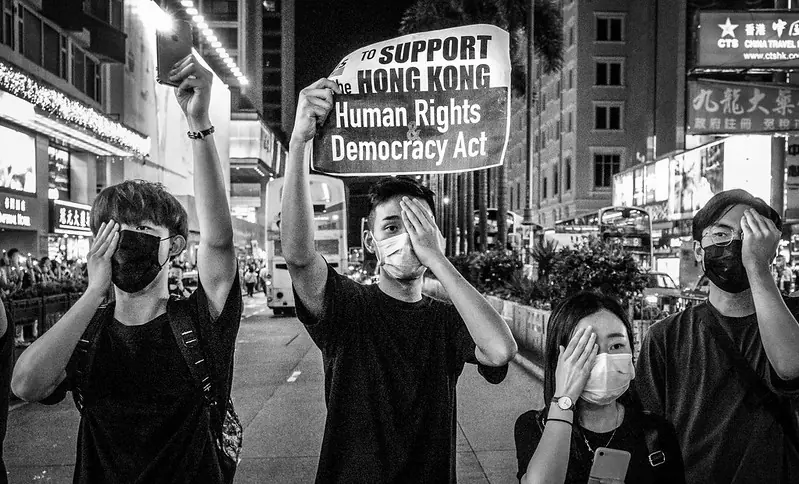
Nonetheless, the religious role in the changing political dynamics has been notably underrepresented and even absent from the focus on recent politics.
When religion is addressed, attention is often given to Christianity while leaving out the diffused religious-cultural diversity in Hong Kong. Responding to the 2019 movement for instance, Hong Kong’s then Chief Executive Carrie Lam employed the discourse of motherly love to justify her political stance which registered political relations as Confucian family relations, constructing political actors as either filial dependents or benevolent but firm parental-officials.
This book illustrates how Lam’s discourse of motherly love embodied both the familial nationalism in contemporary China as well as Hong Kong’s “colonial traditionalism” as a strategy for the leadership to justify high-handed politics, registering political relations as Confucian family relations and disguising political violence as familial duty.
Transforming the Political Discourse of Love in Transnational Activism
Love is not only a tool of top-down propaganda of course. The conclusion, entitled “Transforming the Political Discourse of Love,” discusses how ordinary people respond to and even transform official discourses, including how protestors reclaimed love for Hong Kong in their own language such as “We fucking love Hong Kong” (ngo die zan hai hou len zung ji heung gong 我哋真係好撚鍾意香港) and challenged the official political discourse of love.
Activists have also been employing the language of love to demonstrate political solidarity and the loving and supportive bond beyond blood kinship and the state-sanctioned version of unity such as aiguo 愛國 (patriotism). During the White Paper movement in 2023, one of the most circulated slogans declared that “Love not the nation but ourselves, our friends, our chosen family, the Great Earth, and freedom; Not your patriot; Stand with Uyghur Muslims, Tibetans, HongKongers, Taiwanese, Iranians, Ukrainians, Stand with people of the whole world against autocracy, oppression, and violence.”
This is a moving testimony that love remains a powerful political discourse to re-define and re-enchant affective politics in transnational activism. In this way, this book also holds broader comparative significance for our era marked by explicit religious nationalism or implicit enchanted political affects around the world.
Critical and Decolonial Approaches to Religion
This book applies a critical and decolonial approach to religion to include Confucianism, popular religion, ghost stories, and folklores in their diffused, covert, implicit forms, against the Western Protestant-centric definition of religion, modernity, and secularism.
Explore Books Written by Our Contributors
Increasing scholarship in China studies suggests the enchanted nature of communist revolutions, lending religious studies important intellectual reference regarding the distinction between religion and secular politics.
This method has larger significance for decolonizing religious studies. East Asian religions are often viewed as irrelevant to modernity, but the diffused religion framework shows that “religion” and politics have always been inseparable in many nations’ modernization and even democratization processes, not in terms of institutional involvement but for instance religious immersion or allusion in political discourses and statecraft.
Political Religion
The concept of political religion for this book builds on the work of Italian historian Emilio Gentile.
This book shows that religious affects cannot be divorced from language.
Political religion emphasizes the sacralization of politics of an exclusive and integralist character that rejects coexistence with other political ideologies and movements and denies the autonomy of the individual with respect to the collective, prescribes the obligatory observance of its commandments and participation in its political cult, and sanctifies violence as a legitimate arm of the struggle against enemies, and as an instrument of regeneration.
In my project, political religion relies on the power—and the language—of love to advance its agenda.
Language of Religious Affects and Nationalism
How does this book help us understand emotions, religion, language, and nationalism in the world around us? This book builds on but further a forefront theory in religious studies, namely religious affects.
Donovan Schaefer most famously proposed in Religious Affects (2015) that religion is not necessarily linked to language and belief but primarily driven by affects.
Unlike earlier scholars such as William James (1902) who emphasized personal feelings or Rudolf Otto (1923) who tied them to higher existence, Schaefer highlights how religious affects intersect with various fields of power, making the personal inherently political.
This book shows that religious affects cannot be divorced from language. In the case of the US as well, many have argued that the expression “Make America Great Again” evokes the Great Awakening sentiments and inherits the rhetoric of American civil religion to contextualize disparate sources of social resentment as emblematic of a broader story of American decline and legitimizes the defense of white male privilege as the vital center of efforts to restore national glory.
In other words, religious affects transpire with certain rhetoric and discourses. Using the case of modern China, this book demonstrates how religious affects are generated, ratified, and animated by the language as well as the power of such affects. This book then also holds broader significance for understanding global religious nationalisms of our time especially religious nationalisms of places commonly assumed to be secular.
By interrogating secular narratives of (socialist) modernity, offering a new perspective on the role of religion and religious affects in contemporary politics, and advancing the study of religious affects by pointing out that political efficacy flows through not only bodies and emotions but also specific languages of affects, this book should be relevant for the study of affective governance and religious nationalisms around the world today.


